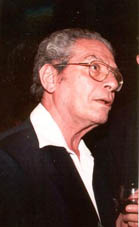В начале 1943 года юденрат (нем. Judenrat — "еврейский совет") Виленского гетто объявил о проведении музыкального конкурса. В нем победила мелодия, сочиненная одиннадцатилетним мальчиком по имени Алек Волковыский. Алек посещал музыкальную школу в гетто и уже сочинил несколько других песен, в том числе музыку на стихи Aвраама Суцкевера "Возьми оружие" (ид. трансл. A nem ton dem ayzn). К этому времени мальчик уже был хорошо известен как замечательно талантливый пианист.
Сочинение "Тише, тише" (ид. трансл. Shtiler, shtiler), слова к которому позже написал поэт гетто Шмерке Качергинский, стало одной из самых любимых песен у узников гетто. Эта колыбельная впервые прозвучала в 1943 году, на одном из последних концертов, организованных юденратом накануне ликвидации гетто. Из-за растущего напряжения первоначальную строку стихотворения "все дороги ведут в Понары" пришлось заменить на "сейчас все дороги ведут туда". Несмотря на эти изменения, зрители понимали, что именно подразумевалось в тексте, и песня стала хитом.
После ликвидации гетто, Волковыский и его мать были отправлены в концентрационный лагерь. Они стали одними из немногих евреев Вильно, которые выжили в этой войне. После освобождения Волковыский переехал в Израиль и стал профессиональным пианистом, выступающим под сценическим псевдонимом A. Taмир. Песня "Тише, тише" по-прежнему очень популярна и часто исполняется. Сегодня её нередко поют в память по убитым евреям Европы.
Список литературы
Fater, Y., 1970. Yidishe muzik in poyln tsvishn beyde velt-milkohmes, Tel Aviv: Velt federatsye fun poylishe yidn.
Freund, F., Ruttner, F. & Safrian, H. eds., Ess Firt Kejn Weg Zurik.: Geschichte und Lieder des Ghettos von Wilna, 1941-1943, Vienna: Picus.
Katsherginski, S. & Leivick, H. eds., Lider fun di Getos un Lagern, New York: Alveltlekher Yidisher Kultur-Kongres.es.






